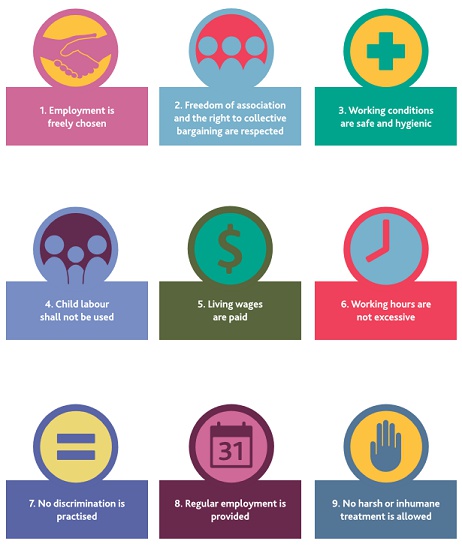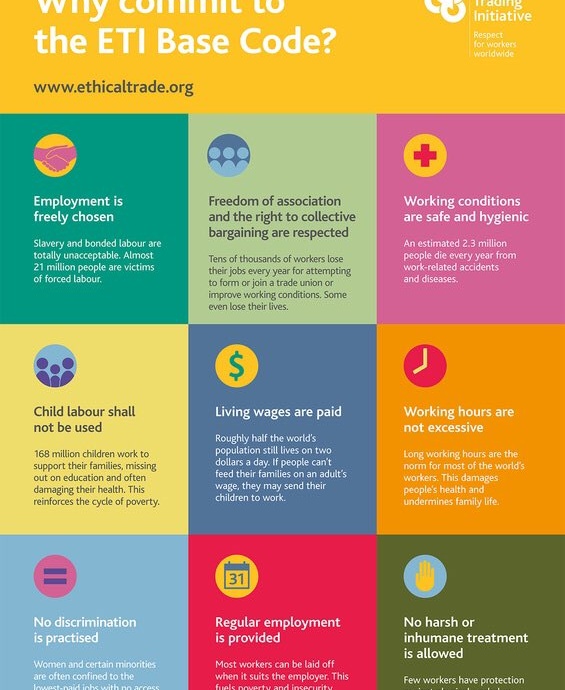Enter the Ethical Trading Initiative (ETI) Base Code, a cornerstone for promoting ethical labor practices across industries. Developed to combat these injustices, the ETI Base Code is a set of internationally recognized standards that companies can adopt to ensure fair treatment of workers throughout their supply chains.
By adhering to this code, businesses commit to upholding fundamental human rights, fostering safe and decent working conditions, and paving the way for more ethical trade worldwide.
In this article, we explore the environmental benefits of corrugated packaging boxes, their role in the circular economy, and more.
What is the ETI Base Code?
The ETI Base Code is a globally recognized set of labor standards designed to promote and protect workers’ rights across international supply chain.
Developed by the Ethical Trading Initiative (ETI), the Base Code sets forth clear, actionable guidelines that companies can follow to ensure ethical treatment of workers.
Its purpose is to establish a common framework for ethical labor practices, ensuring that workers are treated fairly, work in safe conditions, and receive equitable compensation.
The Base Code serves as a benchmark for businesses committed to social responsibility and ethical trade, guiding them toward sustainable and humane employment practices.
Brief history of the development of the Base Code.
The ETI Base Code was developed as a foundational tool to achieve this objective. Drawing on the core conventions of the International Labour Organization (ILO), the Base Code was designed to be a practical, implementable standard that companies could adopt to ensure compliance with ethical labor practices.
Over the years, the ETI Base Code has evolved, reflecting ongoing dialogue with stakeholders and adapting to new challenges in the global labor market.
Why the ETI Base Code is crucial?
The ETI Base Code is crucial for ethical labor practices for several reasons:
- Promotes Fair Treatment: By adhering to the Base Code, companies commit to treating workers with dignity and respect, ensuring their rights are upheld and their voices heard.
- Ensures Safe Working Conditions: The Code mandates safe and hygienic working environments, reducing the risk of accidents and illnesses, and promoting overall worker well-being.
- Combats Child and Forced Labor: The Base Code’s strict prohibitions against child labor and forced labor are vital for protecting vulnerable populations and promoting social justice.
- Advocates for Fair Wages: By requiring the payment of living wages, the Code helps lift workers out of poverty and enables them to meet their basic needs, fostering economic stability and growth.
- Prevents Discrimination: The Code’s principles ensure that all workers are treated equally, regardless of their background, fostering inclusive and diverse workplaces.
- Promotes Regular Employment: By emphasizing the importance of stable employment, the Base Code helps workers achieve financial security and job satisfaction.
- Upholds Human Rights: Overall, the Base Code is a vital tool for upholding human rights in the workplace, ensuring that workers are not subjected to harsh or inhumane treatment.
In a world where supply chains often span multiple countries and involve complex labor arrangements, the ETI Base Code provides a clear, consistent standard that helps companies navigate these challenges and ensure their operations are ethically sound.
By adopting the Base Code, businesses not only protect workers but also enhance their reputation, build consumer trust, and contribute to a fairer, more equitable global economy.

Key Principles of the ETI Base Code
1. Employment is Freely Chosen
- Explanation: This principle asserts that all work should be conducted on a voluntary basis, without any form of coercion, slavery, or forced labor. Workers should have the freedom to leave employment after giving reasonable notice.
- Importance: Preventing forced labor is crucial for protecting human dignity and ensuring that individuals are not exploited. This principle helps combat modern slavery, human trafficking, and other forms of involuntary labor, ensuring that all workers are treated as free and autonomous individuals.
2. Freedom of Association and the Right to Collective Bargaining
- Explanation: Workers have the right to form and join trade unions of their choosing and to bargain collectively. This principle ensures that employees can organize themselves to negotiate terms and conditions of employment.
- Importance: The ability to organize and bargain collectively is fundamental to improving working conditions and wages. It empowers workers to have a voice in their employment terms, leading to fairer and more balanced labor relations.
3. Safe and Hygienic Working Conditions
- Explanation: Employers must provide a safe and hygienic working environment, taking necessary steps to prevent accidents and health hazards. Regular health and safety training should be provided, and facilities should meet minimum safety standards.
- Importance: Safe workplaces are essential for protecting the physical and mental health of workers. By ensuring safe and hygienic conditions, employers can prevent workplace injuries and illnesses, thereby enhancing productivity and worker satisfaction.
4. No Child Labor
- Explanation: This principle prohibits the employment of children. It requires that businesses do not use child labor and comply with relevant national and international laws regarding the minimum age of employment.
- Importance: Prohibiting child labor is vital for protecting children’s rights and ensuring their proper development. It helps prevent the exploitation of children, allowing them to receive education and enjoy their childhood.
5. Living Wages are Paid
- Explanation: Workers should be paid wages that are sufficient to meet their basic needs and provide some discretionary income. This principle ensures that employees receive fair compensation for their work.
- Importance: Paying living wages is crucial for alleviating poverty and ensuring that workers can afford necessities such as food, housing, and healthcare. It promotes economic stability and helps reduce income inequality.
6. Working Hours are Not Excessive
- Explanation: This principle mandates that working hours comply with national laws and collective agreements, and that workers are not required to work excessive hours. Overtime should be voluntary and compensated appropriately.
- Importance: Reasonable working hours are essential for maintaining work-life balance and preventing burnout. Limiting excessive work hours protects workers’ health and well-being, leading to increased job satisfaction and productivity.
7. No Discrimination
- Explanation: Employers must ensure that there is no discrimination in hiring, compensation, access to training, promotion, termination, or retirement based on race, caste, nationality, religion, age, gender, sexual orientation, disability, or political affiliation.
- Importance: Promoting equality and non-discrimination in the workplace is fundamental to creating a fair and inclusive environment. It ensures that all workers have equal opportunities and are treated with respect and dignity.
8. Regular Employment
- Explanation: Work performed should be based on recognized employment relationships established through national law and practice. This principle discourages the use of temporary or casual labor without proper employment contracts.
- Importance: Regular employment contracts provide workers with job security and stability, allowing them to plan for their future. It ensures that workers receive the benefits and protections associated with formal employment, such as social security and health benefits.
9. No Harsh or Inhumane Treatment
- Explanation: Employers must treat all workers with respect and dignity. Physical abuse, harassment, threats, or any form of intimidation or degrading treatment is strictly prohibited.
- Importance: Ensuring no harsh or inhumane treatment is fundamental to maintaining a respectful and supportive workplace. It protects workers from abuse and promotes a positive and productive work environment.
By adhering to these principles, companies can create ethical and sustainable supply chains that respect workers’ rights and promote fair labor practices.
Benefits of Adopting the ETI Base Code
For Companies
- Improved Reputation: Adopting the ETI Base Code enhances a company’s reputation as a socially responsible business. Consumers, investors, and partners are increasingly looking for ethical and sustainable business practices. By aligning with the ETI Base Code, companies can demonstrate their commitment to ethical labor practices, which can attract positive attention and foster goodwill.
- Consumer Trust: In today’s market, consumers are more conscientious about the ethical implications of their purchases. Companies that adhere to the ETI Base Code can build trust with their customers, who are more likely to support businesses that prioritize fair treatment of workers. This trust can translate into increased customer loyalty and sales.
- Operational Efficiency: Ethical labor practices can lead to a more motivated and productive workforce. When workers are treated fairly and work in safe conditions, they are more likely to be engaged and committed to their jobs. This can result in lower turnover rates, reduced absenteeism, and higher overall productivity.
- Risk Management: Compliance with the ETI Base Code can help companies mitigate risks related to labor rights violations, such as legal penalties, negative publicity, and supply chain disruptions. By proactively addressing these issues, businesses can avoid costly repercussions and maintain smooth operations.
- Market Differentiation: In competitive markets, adopting the ETI Base Code can serve as a unique selling point. Companies that can effectively communicate their commitment to ethical practices may stand out from competitors and appeal to a growing segment of ethically minded consumers.
For Workers
- Better Working Conditions: The ETI Base Code ensures that workers are employed in safe and hygienic conditions. This reduces the risk of workplace injuries and illnesses, contributing to a healthier and more secure work environment.
- Fair Treatment: Adherence to the Base Code guarantees that workers are treated with dignity and respect. It prohibits discrimination and harsh treatment, fostering a workplace where all employees feel valued and protected.
- Living Wages: By mandating living wages, the ETI Base Code helps workers earn enough to meet their basic needs and support their families. This financial security can lead to improved quality of life and reduced economic stress.
- Job Stability: The principle of regular employment ensures that workers have stable jobs with formal contracts, providing them with job security and access to benefits such as health insurance and social security.
- Empowerment: Workers’ rights to freedom of association and collective bargaining empower them to advocate for their interests. This can lead to better working conditions, fairer wages, and more equitable treatment.
For Society
- Reduced Poverty: By ensuring that workers are paid living wages and work in fair conditions, the ETI Base Code helps reduce poverty levels. When workers earn fair wages, they can support themselves and their families, leading to improved economic stability within communities.
- Improved Social Justice: The principles of non-discrimination and prohibition of child and forced labor contribute to greater social justice. Ensuring equal treatment and protecting vulnerable populations help create a more equitable society where everyone has the opportunity to succeed.
- Economic Development: Ethical labor practices can contribute to sustainable economic development. Fair wages and safe working conditions can lead to a more stable and productive workforce, which in turn supports broader economic growth and development.
- Positive Global Impact: As more companies adopt the ETI Base Code, the cumulative effect can lead to significant improvements in labor practices worldwide. This can help raise standards across industries and countries, promoting global social and economic progress.
- Enhanced Corporate Social Responsibility (CSR): Widespread adoption of the ETI Base Code reinforces the importance of corporate social responsibility. It encourages companies to go beyond profit and consider the broader impact of their operations on society and the environment.
By embracing the ETI Base Code, companies not only contribute to the well-being of their workers but also play a pivotal role in driving positive change within society. This holistic approach benefits businesses, employees, and communities alike, paving the way for a more ethical and sustainable future.
Successful Implementations: GCB Malaysia
Steps Taken to Implement the ETI Base Code
Assessment and Alignment: GCB Malaysia conducted a thorough assessment of its existing labor practices and identified areas that needed improvement to align with the ETI Base Code. This included reviewing policies, procedures, and worker conditions across its operations.
Training and Awareness: The company initiated comprehensive training programs for its management and staff to ensure they understood the principles of the ETI Base Code and their roles in implementing these standards. Awareness campaigns were also conducted to educate workers about their rights and the importance of ethical labor practices.
Policy Development: GCB Malaysia developed and revised its labor policies to comply with the ETI Base Code. This included policies on non-discrimination, fair wages, safe working conditions, and the prohibition of child and forced labor.
Monitoring and Evaluation: The company established robust monitoring and evaluation mechanisms to ensure ongoing compliance with the ETI Base Code. Regular audits, both internal and external, were conducted to assess adherence to the standards and identify areas for further improvement.
Stakeholder Engagement: GCB Malaysia engaged with various stakeholders, including suppliers, workers, and local communities, to ensure a collaborative approach to implementing the ETI Base Code. The company worked closely with suppliers to ensure they also adhered to ethical labor practices.
Positive Outcomes Achieved
Improved Working Conditions: One of the most significant outcomes of adopting the ETI Base Code has been the improvement in working conditions at GCB Malaysia. The company has made substantial investments in enhancing workplace safety, including upgrading equipment, improving facilities, and providing regular health and safety training. This has led to a noticeable reduction in workplace accidents and health issues.
Fair Wages and Financial Stability: By committing to paying living wages, GCB Malaysia has ensured that its workers earn enough to support themselves and their families. This financial stability has improved the quality of life for employees, reducing economic stress and enabling them to invest in education, healthcare, and other essential needs.
Empowered Workforce: The emphasis on freedom of association and collective bargaining has empowered GCB Malaysia’s workers to have a voice in their working conditions. This has fostered a more collaborative and inclusive work environment, where employees feel respected and valued.
Enhanced Reputation and Consumer Trust: Adopting the ETI Base Code has bolstered GCB Malaysia’s reputation as a socially responsible company. This has translated into increased consumer trust and loyalty, as customers and partners recognize the company’s commitment to ethical practices. The positive reputation has also opened up new market opportunities and strengthened relationships with key stakeholders.
Supply Chain Improvements: GCB Malaysia’s commitment to the ETI Base Code has had a ripple effect throughout its supply chain. By working closely with suppliers to ensure they also adhere to ethical labor practices, the company has helped improve standards across the cocoa industry. This has contributed to more sustainable and fair supply chains, benefiting workers and communities involved in cocoa production.
Social and Economic Impact: The positive changes implemented by GCB Malaysia have extended beyond the company to the wider community. By providing fair wages and safe working conditions, the company has contributed to reducing poverty and enhancing social justice in the regions where it operates. This has had a broader economic impact, supporting local development and improving living standards.
Conclusion
The successful implementation of the ETI Base Code by GCB Malaysia serves as a powerful example of how businesses can drive positive change through ethical labor practices.
By committing to the principles of the ETI Base Code, GCB Malaysia has not only improved the lives of its workers but also strengthened its business, enhanced its reputation, and contributed to broader social and economic progress.
This highlights the tangible benefits that can be achieved when companies prioritize ethical standards and demonstrate a genuine commitment to social responsibility.







